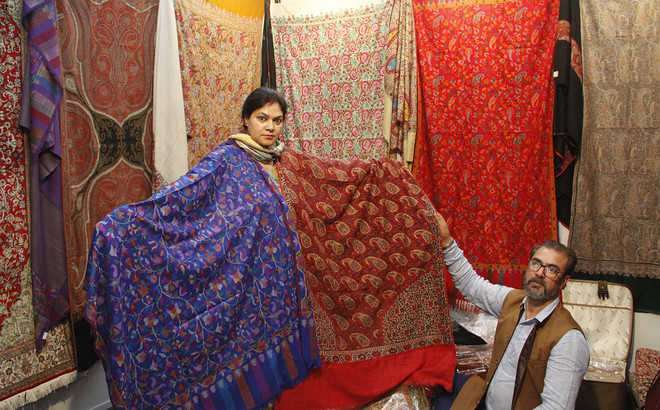
A trader shows Mughal Era shawls at the South Asia Expo-cum-Consumer Fair in Jalandhar on Friday. Photo: Sarabjit Singh
Tribune News Service
Jalandhar, February 17
Handwoven shawls were a major attraction on day two of the South Asia Expo-cum-Consumer Fair at Desh Bhagat Yaadgar Hall today.
Shawls ranging from Rs 1.25 lakh to Rs 4 lakh caught attention of the people with their classy colours and designs depicting the Mugal period. Varieties ranged from Persian and Irani handwork on pure and semi Pashminas, besides antique shawls, including Jamewar and Kanikar.
Abdul Rauf, a trader from Srinagar said the exquisite fabric called Kanikar is not just a piece wrapped loosely around the shoulders or to cover the head. “It is the story of snowy Valley of Kashmir,” he added.
“Kanikar shawls are an ensemble of prestige for the state of Kashmir. Also known as Tilliwalla or Tilikar, these shawls are one of the two varieties weaved in the Valley. Loom woven garments are absolutely amazing. The Kani loom fabrics are the pulse of the Kashmir fabric industry,” said Rauf.
The foremost written accounts of the Kani shawls can be traced back to the Mughal times. “It is believed and widely read that Mughal Emperor Akbar was very fond of this fabric. He admired them to such an extent that he owned quite a number of them and also wrote about them in ‘Ain-i-Akbari’,” he added.
The design on these shawls is inspired by the literature that breathes life into the fabric and is drawn from imitations of natural ambience like flora and fauna. Embroidery in bright and contrasting colours makes the fabric look feminine.
Also, amongst other articles, the traditional heeng, herbal green jeera, itar and dry fruits from Egypt attracted lot of buyers. “Amongst other items, herbal jira and heeng are selling like hot cakes,” said Isa Mohammad, a trader from Abu-Dabi in Dubai.
Meanwhile, stalls left vacant by Pak traders, who could not participate in the trade fair due to non-granting of visa, were given to local traders.



























